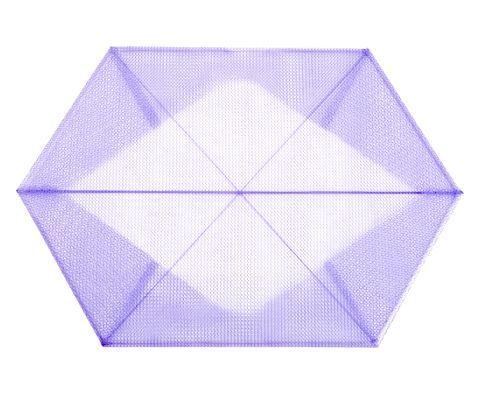Physiomesh Flexible Composite Hernia Mesh
Physiomesh Flexible Composite is a brand of hernia mesh. Johnson & Johnson subsidiary Ethicon manufactures it. Ethicon pulled a version of Physiomesh off the market in 2016. High failure rates led to hernias recurring.
Physiomesh Flexible Composite Mesh is a partially absorbable surgical mesh for hernia repair.
Recurrence was the most common complication before the hernia mesh’s invention. Research is mixed on how long a mesh hernia repair will last. A 2022 study followed 100 patients for ten years after a ventral abdominal hernia repair.
No recurrence was recorded after three years, while about 10% had a recurrence after roughly eight years. Two patients had a central breakdown of the mesh at about seven years. Mesh had stretched across the defect by an average of 21%. Mechanical testing showed that the mesh lost its elasticity at low forces.
Ethicon used to manufacture two versions of the mesh.
One version used in minimally-invasive hernia surgeries had high failure rates. In 2016, Ethicon removed that version from the global market.
Ethicon’s 2017 product catalog showed that the company still marketed a Physiomesh version for open hernia repairs. Open repairs are traditional surgery techniques.
What Is Physiomesh?
Physiomesh is a coated surgical mesh used in hernia repairs. The mesh is made from polypropylene, a type of plastic. It is sandwiched between two thick synthetic film layers. The patient’s body absorbs the laminated film coating over time.

Physiomesh Hernia Repair with Laparoscopic Surgery
The Physiomesh version removed from the market was for laparoscopic surgery. This is a minimally-invasive technique.
A surgeon makes several small incisions. He then inserts surgical tools through the incisions. The surgeon uses the tools to implant and secure the mesh in place around the hernia.
Ethicon designed Physiomesh with a coating to prevent adhesions. The body absorbs the coating over several weeks.
Tissue grows into the mesh’s pores over time. This “ingrowth” should strengthen the repair. But it did not always strengthen repairs. And the mesh sometimes adhered to organs in the body.
Hernia Recurrence and Other Complications
Hernia recurrence was the most common Physiomesh complication requiring surgery. Recurrence is when a hernia comes back after surgery.
The Polish Hernia Study Group ran a clinical trial with Physiomesh in 2015. The trial included Physiomesh Flexible Composite Mesh for laparoscopic surgery. The group terminated the trial when researchers noticed higher than expected recurrences.
Ethicon then removed Physiomesh’s laparoscopic version from the market. In addition to high recurrence rates, doctors and patients reported other complications to the FDA.
- Hernia recurrence
- Mesh folding or bunching up
- Adhesions
- Failure to incorporate into the body
- Pain
- Inflammatory reactions
Physiomesh Recalls and Market Withdrawals
Ethicon pulled all units of Physiomesh for laparoscopic surgery off the global market in May 2016.
Ethicon sent out an Urgent Field Safety Notice. The notice explained why Ethicon ordered the market withdrawal. The notice also affected Ethicon Laparoscopic Hernia Kits.
“The recurrence/reoperation rates (respectively) after laparoscopic ventral hernia repair using ETHICON PHYSIOMESH™ Composite Mesh were higher than the average rates of the comparator set of meshes among patients in these registries.”
Ethicon later discontinued laparoscopic versions of Physiomesh.
FDA 510(k) Clearance
The FDA approved Physiomesh in 2010 through its 510(k) process. The process allows for less stringent testing. Ethicon only had to show the mesh was “substantially similar” to a device already on the market.
Ethicon declared Physiomesh substantially equivalent to three other products Ethicon made.
The FDA started receiving reports of Physiomesh failures shortly after the approval. The reports detailed recurring hernias, adhesions and infections.
Physiomesh Lawsuits
Hundreds of people who suffered Physiomesh injuries sued Ethicon. A federal panel combined the first 16 Physiomesh lawsuits in June 2017.
The first Physiomesh trial is expected in November 2020, with the second and third trials in 2021. There were 2,907 Physiomesh lawsuits pending in federal multidistrict litigation as of July 2020.
Several other Physiomesh lawsuits are pending in state court in Atlantic County, New Jersey. The New Jersey Supreme Court consolidated the cases into a multicounty litigation in August 2018. In July 2020, the judge extended discovery deadlines to July 2021.
The lawsuits accuse Ethicon of failing to warn people about Physiomesh risks. They also accuse the company of negligence and putting a defective product on the market.
Calling this number connects you with a Drugwatch.com representative. We will direct you to one of our trusted legal partners for a free case review.
Drugwatch.com's trusted legal partners support the organization's mission to keep people safe from dangerous drugs and medical devices. For more information, visit our partners page.


